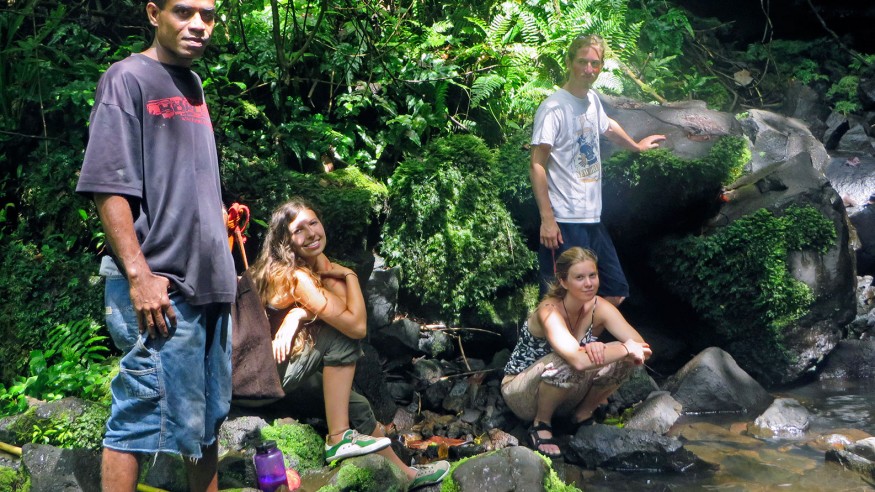
Island Magic
From left: Salik Wakuk, Kosraen guide; Erika Nininger ’14; Karena Briggs ’13; and Samuel Sonnega ’14. (Photo courtesy of Jim Peoples)
This past summer, two Ohio Wesleyan students, one recent graduate, and Professor Jim Peoples traveled to Kosrae Island (within the Federated States of Micronesia) for their Theory-to-Practice project, “Ethnographic Research on Kosrae Island, Federated States of Micronesia.” Their primary objective, as stated in the official grant, was to interview the people there and evaluate their methods of communication with media, analyze their current attitudes and, as he describes, “plans for future emigration, their feelings about the recent presence of other Christian denominations on the island, and their food preferences and knowledge of farming and food processing practices.” Peoples was accompanied by Karena Briggs ’13, Erika Nininger ’14, and Samuel Sonnega ’14. So successful was their trip, that the students and their professor agreed to present their findings recently at a student sociology conference at Kent State University.
Kosrae is one of four states of the Federated States of Micronesia, and includes the main island of Kosrae and more than 10 different neighboring islands and islets. With a population of just over 6,000 people, according to a 2010 census, Kosrae is located approximately 400 miles north of the equator.
While in Kosrae, the students were able to help collect data for Peoples’s upcoming book. Sonnega described their activities during the 16-day period as not only enlightening academically, but also as a means of expanding their worldviews and the capabilities they possess to acquire and interpret new knowledge. The group interviewed local people and tried to learn as much about the culture as possible within their time there. They stayed with a Kosraean family for three days. While immersing themselves in the culture, the group also managed to climb the largest mountain on the island, Mount Finkol.
The kindness and generosity of the Kosraean people left a lasting impact on the group. The culture, as rich and exotic as it was, provided a sense of unity and compassion for the Ohio Wesleyan group. They found that such things as food transpired the applications of simple nourishment and instead, became a primary social activity.
“Because Kosrae is a small island, it lends itself well to study,” says Nininger. “We talked to people about many aspects of the island including climate change, invasive species, agriculture, church and religion, and the history of the island. We were inexplicably lucky to have had the opportunity to go there, let alone go with Professor Peoples whose friends and “family” shared openly with us their feasts, songs, and joy, all of which were immeasurable.”
When asked at the conference, about the overall impression regarding OWU’s Theory-to-Practice program and the traveling he has done while at Ohio Wesleyan, Sonnega shared that those experiences have been among the most meaningful experiences in his life.
”I think the goal of an education should not be to tell students what to think, but instead how to think, and to give them lenses through which to view the world, and to give them the freedom to have and defend opinions about anything,” says Sonnega. “Travel is a way to cultivate that freedom by experiencing a broad spectrum of the world. I’m very thankful OWU has given me that freedom.” Their time spent in Kosrae was valuable, and offered an opportunity for his students to see a part of the world and culture they might not otherwise be able to experience, says Peoples.
“Their presence also gave me a sense that my own impressions as an outsider were supported by more than me. The Kosrae might look to be poor, for example, but they are not. Their needs are met.” Peoples explains that there is no hunger on the island and the people enjoy a rich social and spiritual life, and that the church is the center of their social life.
Peoples is a professor in the sociology-anthropology department at OWU. His work includes multiple articles and chapters in academic journals and scholarly texts, including a book about Kosrae. He recently has published the 10th edition of a book entitled “Humanity.”The data and experiences garnered on this trip will assist him in completing his new book about Kosrae.
